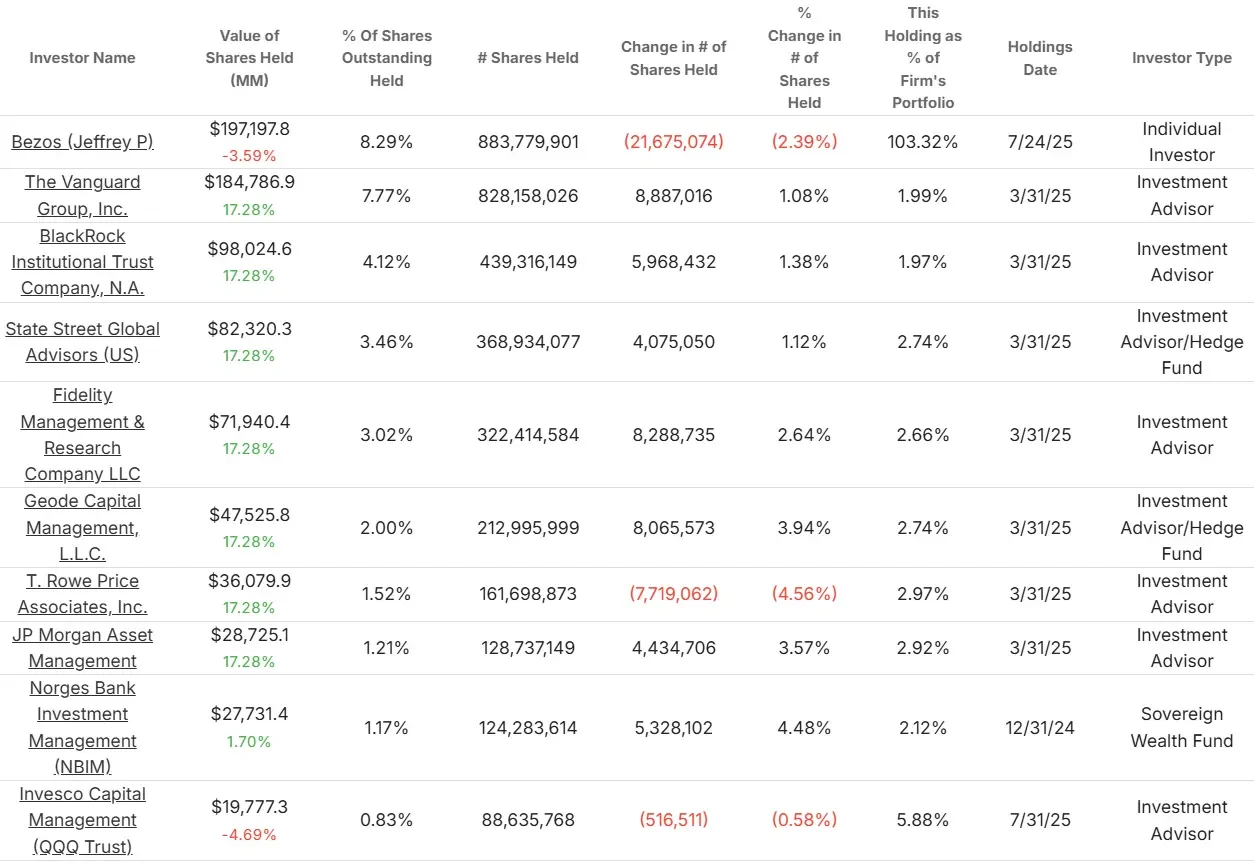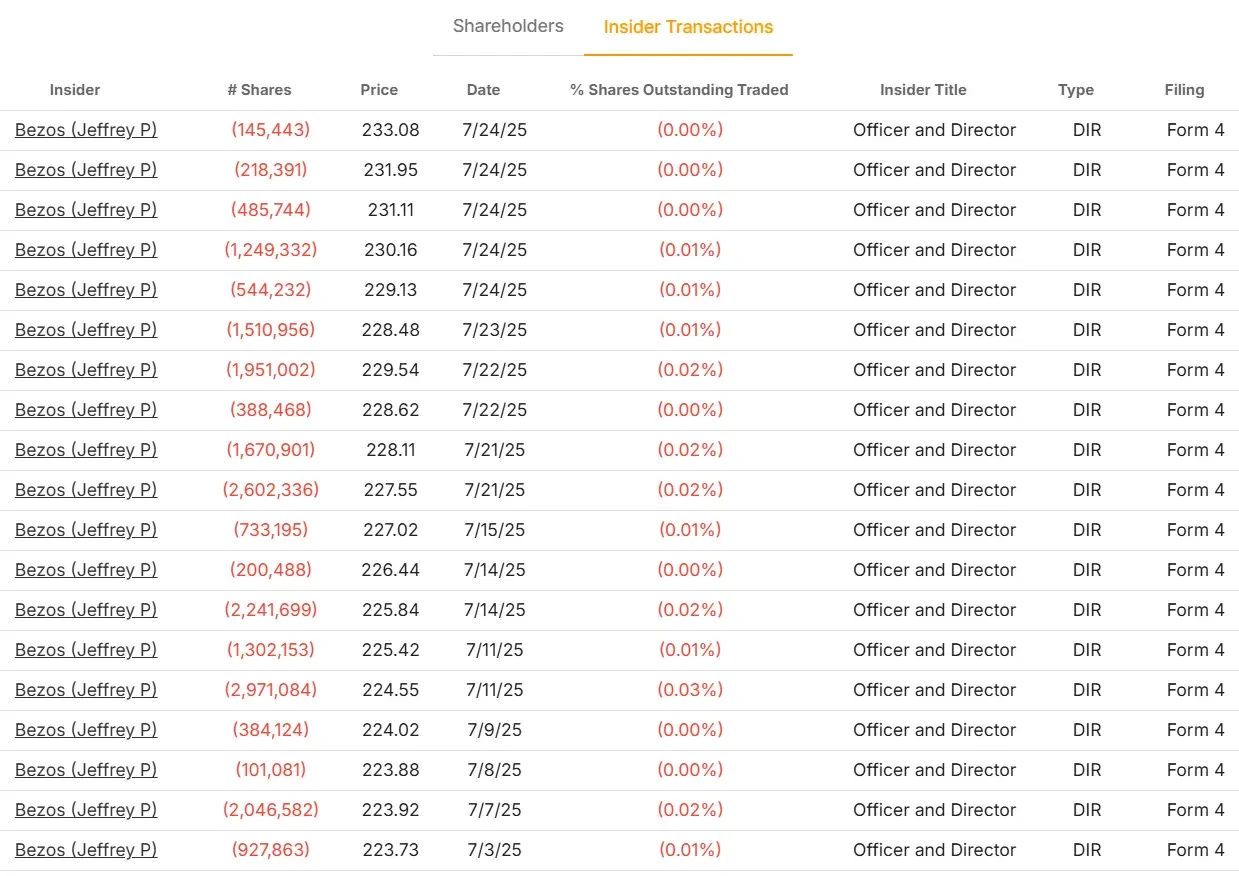Amazon (NASDAQ: AMZN) has climbed over 37% in the past year, with shares now trading around $223 and its market cap sits above $2.37 trillion. Investors are rewarding Amazon’s shift toward stronger margins, better capital discipline, and a more focused long-term strategy.
Amazon’s founder, Jeff Bezos, recently sold $4.5 billion worth of shares, part of a broader trend of him gradually stepping back from the company. Instead, power is flowing to the institutions: index giants like BlackRock and Vanguard, as well as high-conviction allocators such as sovereign wealth funds and long-term growth investors.
This new shareholder base sees Amazon as more than an e-commerce or cloud giant. It is becoming a dependable compounder with durable cash flows, exposure to AI infrastructure, and a central role in the portfolios of investors who want innovation without extreme risk. A closer look at who is buying and who is stepping back offers a window into what the market thinks about Amazon.
Who’s Betting Big on Amazon’s Next Chapter

As of the most recent filings, Amazon’s shareholder base is dominated by a combination of institutional giants and long-term individual holders. The largest single shareholder is Jeff Bezos, who still holds over 883 million shares, or 8.29% of the company. While he sold over 21 million shares in July 2025, his remaining stake is valued at approximately $197 billion, making him the most influential individual holder by far.
Among institutional investors, Vanguard holds 828 million shares, representing 7.77% of Amazon. The firm added nearly 9 million shares last quarter, reinforcing its role as a long-term backer of the company. BlackRock follows closely with a 4.12% stake, or 439 million shares, after increasing its position by nearly 6 million shares.
Other major holders include State Street with 3.46% of shares, Fidelity with 3.02%, and Geode Capital at 2.0%. Together, these top passive investors own well over 20% of the company, reflecting Amazon’s heavy weighting in benchmark indices like the S&P 500 and total market ETFs.
On the active management side, Norges Bank Investment Management raised its position by 4.48% to 124 million shares, showing renewed conviction from the Norwegian sovereign wealth fund. Meanwhile, T. Rowe Price and Capital Research trimmed their positions, with T. Rowe selling over 7.7 million shares during the quarter.
Despite modest selling from some managers, institutional ownership of Amazon remains broad and deep. With over 90% of shares in the public float, movements from top shareholders offer clear insight into how global capital allocators view Amazon’s long-term potential.
See the top shareholders for 50,000+ stocks and track the top holdings of 10,000+ hedge funds >>>
Why Jeff Bezos Sold $4.8 Billion Worth of Amazon Stock

In July 2025, Jeff Bezos executed a wave of large share sales, offloading more than 21.6 million shares across multiple filings between July 3 and July 24. The total value of the transactions exceeded $4.8 billion. While substantial in dollar terms, the sales represented less than 5% of his overall stake.
These sales were disclosed via Form 4 filings with individual blocks ranging from several hundred thousand shares to nearly 3 million in a single day. Bezos still owns more than 883 million shares, and there has been no indication that these transactions reflect a shift in strategic outlook or long-term conviction.
Other insiders have shown limited activity. Doug Herrington, Amazon’s CEO of Worldwide Stores, sold a small number of shares at the end of June, totaling fewer than 2,500 shares.
There have been no insider purchases reported in recent months. While that is typical for a company of Amazon’s size, the lack of buying reinforces that recent ownership movements are being driven almost entirely by institutional capital rather than insider conviction in the public market.
See recent insider trade data for over 50,000 global stocks (It’s free) >>>
What the Ownership Tells Us
Amazon’s shareholder base reflects its evolution from a founder-led growth company to a widely held, cash-generating global platform. With more than 90% of shares in public float, control has shifted firmly into the hands of institutional investors.
The company benefits from strong support by passive giants like Vanguard and BlackRock, whose continued buying reflects Amazon’s heavyweight role in global benchmarks. At the same time, active investors like Norges Bank and Fidelity have increased their positions, signaling broader confidence in Amazon’s operating leverage, rising returns on capital, and long-term relevance in AI infrastructure.
Jeff Bezos remains the largest single shareholder, but his recent sales suggest a gradual step back rather than a sharp pivot. Insider activity outside of Bezos has been minimal, with no recent buying reported from executives or directors.
Overall, Amazon’s ownership mix highlights growing alignment between the company’s more disciplined financial profile and the long-term priorities of institutional capital. With improving margins, a strong balance sheet, and durable growth engines in cloud, logistics, and AI, Amazon remains a cornerstone position in many of the world’s most influential portfolios.
Wall Street Analysts Are Bullish on These 5 Undervalued Compounders With Market-Beating Potential
TIKR just released a new free report on 5 compounders that appear undervalued, have beaten the market in the past, and could continue to outperform on a 1-5 year timeline based on analysts’ estimates.
Inside, you’ll get a breakdown of 5 high-quality businesses with:
- Strong revenue growth and durable competitive advantages
- Attractive valuations based on forward earnings and expected earnings growth
- Long-term upside potential backed by analyst forecasts and TIKR’s valuation models
These are the kinds of stocks that can deliver massive long-term returns, especially if you catch them while they’re still trading at a discount.
Whether you’re a long-term investor or just looking for great businesses trading below fair value, this report will help you zero in on high-upside opportunities.
Click here to sign up for TIKR and get our full report on 5 undervalued compounders completely free.

